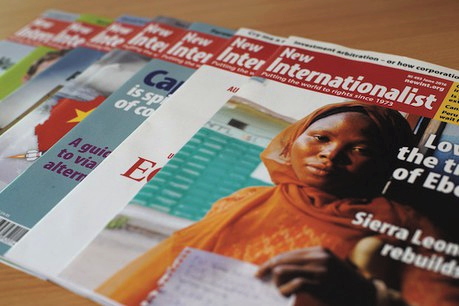Is the U.S. teetering on the edge of bankruptcy?
Published in the July-August 2011 issue of the New Internationalist.
America the destitute? It’s easy to picture the United States as a Hummer packed full of shopping bags, with supersized sodas in the cup-holders and a plasma screen TV poking through the sunroof – a nation whose sins are those of excess. It feels stranger to depict the country as a pauper with its empty pockets pulled inside out.
Yet the idea that Uncle Sam has run out of cash now appears everywhere in public debate. The slogan, ‘We’re broke’ is used to justify an historic shredding of our social safety net.
So, is it true? Is America teetering on the edge of bankruptcy?
The short answer is no. Yes, the cost of America’s private healthcare system is spiralling out of control. The nation will have to address this in coming decades to remain solvent.
Yes, for the sake of the planet, we have to constrain our culture of wanton consumption. And, yes, in the long run, the US must curtail its domestic debts and armed overseas adventurism or it will risk having the dollar displaced as the world’s reserve currency.
But, for the time being, there are few things that offer safer refuge for international investors in moments of distress than the American Greenback.
The biggest problem right now for the economy is not debt. It is that millions of people who want work cannot find jobs. This results both in mass despair and in a huge loss of economic output.
America’s de facto jobs programme, the US military, is a highly inefficient one, with a devilish downside: the steady hiring of soldiers and endless production of arms eventually leads lawmakers to think that these should not be sitting idle.
That we’re supposedly too poor to fund anything except the military is by design. Since the time of Ronald Reagan, the Right has followed a strategy of ‘starving the beast’. Unlike in other countries, advocates of austerity cannot turn to the International Monetary Fund to mandate destruction of widely popular social programmes. Instead, by continually passing tax cuts, they have aimed to deprive the public sector of the funds to carry out initiatives they regard as noxiously redistributive.
No need to campaign against public programmes individually: they defeat them en masse by making it impossible for the state to foot the bill. (Extra bonus: perennial tax cuts disproportionately benefited their wealthy campaign donors.)
One of the radical Right’s Washington Machiavellis, Grover Norquist, famously argued that he sought not merely to emaciate the state but ‘to get it down to the size where we can drown it in the bathtub’.
In the abstract, the strategy might sound only slightly distasteful – and perhaps even a little clever. The reality is more ugly. Deliberate starvation is a cruel and violent act, and murder by bathwater a psychopathic one.
Starving the public means that after-school programmes for children who need them the most are being eliminated; and cities plagued with crime and joblessness add to both by sending police officers into unemployment. Nor is hunger only a metaphor: just when demand for state-supported food stamps reaches a record high, conservatives attack the budget for them.
If the rightwingers continue to have their way, the elderly will be given miserly healthcare vouchers and told that they must barter for medical services on the open market. And the task of finding a US public library with decent hours of operation will grow akin to spotting the elusive California condor.
Today we are seeing that government is not an abstraction. Rather, its services are a basic expression of the common good. They are things that affect the daily lives of most Americans.
As they are eliminated, we are being forced into an unpleasant realization: we are the ones being strangled in the tub. The beast being starved is us.
